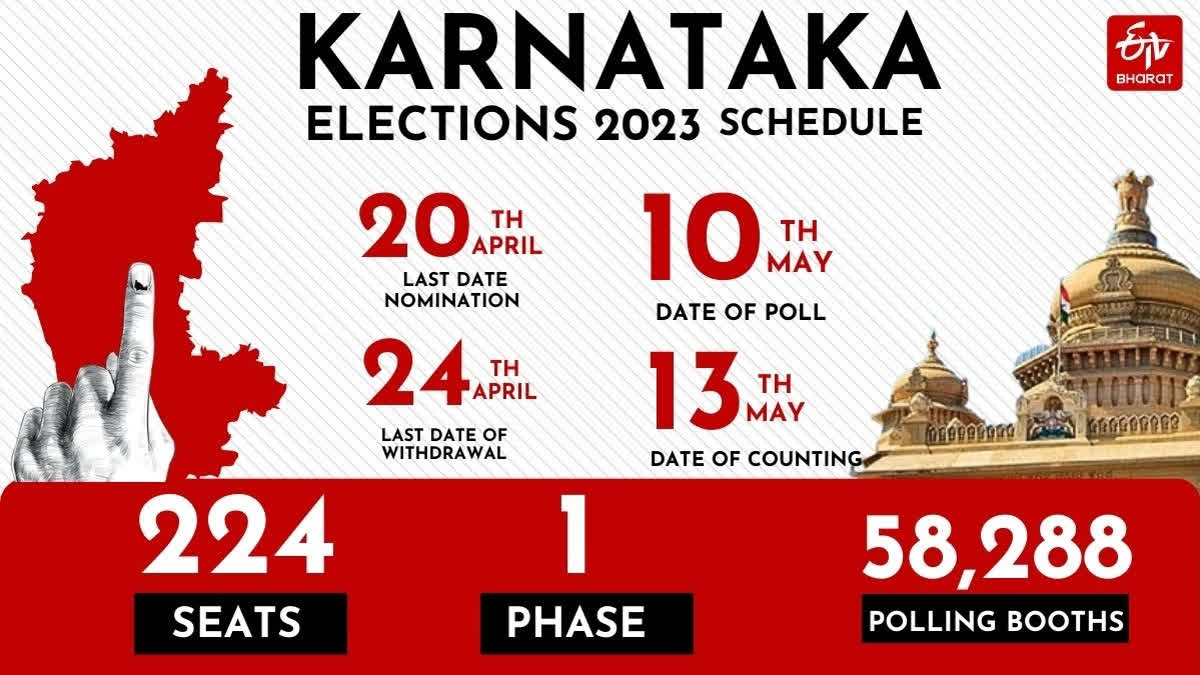New Delhi: The Election Commission of India Wednesday announced the poll schedule for the Karnataka Legislative Assembly Elections 2023. The single-phase voting will take place on May 10 followed by the counting of votes on May 13. The term of the Karnataka Legislative Assembly will end on May 24.
Here are the top 10 points in the big development
- In Karnataka, the stage is set for a key BJP versus Congress electoral fight ahead of the 2024 Lok Sabha showdown. The Janata Dal (Secular) is the third major party in the state which has a 224-member strong assembly, of which BJP currently 119 seats, followed by Congress with 75. The JD (S) has 28 MLAs, while two seats are vacant.
- Addressing a press conference, Chief Election Commissioner Rajiv Kumar said the notification for the elections will be issued on April 13 and the last date for filing nomination papers will be April 20. Kumar said the nomination papers will be scrutinised on April 21 and the last date for withdrawal of nominations will be April 24.
- Kumar said the elections have been scheduled on a Wednesday, and not on a Monday or Friday, to encourage greater participation of voters. "People can take a day off and have a long weekend. But by holding the poll on Wednesday, the possibility has been reduced," he said, adding that the move is part of the EC's effort to ensure greater participation and curb voters' apathy in going to the polling stations.
- The ruling BJP and the Congress have already launched spirited campaigns for the elections. The Model Code of Conduct kicked in on Wednesday with the announcement of the poll. But Kumar said that even before the code got triggered, a strict vigil was ensured by enforcement agencies on the Commission's directions which were during review meetings. More than Rs 80 crore has been seized so far, he said.
- For the assembly elections, 58,282 polling stations will be set up in the state. The average voter per polling station is pegged at 883. Fifty per cent of the polling stations have webcasting facility. A total of 1,320 polling stations will be managed by women officials. Among the over 5,24 crore voters, over 5.60 lakh have been identified as persons with disability, the poll panel said.
- It remains to be seen whether the ruling BJP will buck a four-decade-old trend to script history or if the Congress upstages its saffron rival to up its stakes as a challenger ahead of the 2024 parliamentary polls. No political party has won a successive mandate in the state since 1985 and the BJP is eager to rewrite this bit of history and retain its southern citadel.
- The Congress is keen to wrest power to give the party much-needed elbow room to position itself as the main opposition player in the 2024 Lok Sabha elections. Also what needs to be watched out for is, whether former Prime Minister H D Deve Gowda-led Janata Dal (Secular), will emerge as a "Kingmaker" by holding the key to government formation, in the event of a hung verdict, as it has done in the past.
- Political observers feel anti-incumbency seems to be a key factor in Karnataka polls, as voters have not given any party a successive mandate. It last happened in 1985, when the Ramakrishna Hegde-led Janata Party came back to power. While Congress' vote base is spread evenly across the state, the BJP's is pronounced in the north and central regions due to the concentration of Veerashaiva-Lingayat community in the belt, which forms its major vote bank. JD(S) dominates the Vokkaliga bastion of Old Mysuru (southern Karnataka) region.
- Of Karnataka's population, Lingayats constitute about 17 per cent, Vokkaligas 15 per cent, OBCs 35 per cent, SC/STs 18 per cent, Muslims about 12.92 per cent and Brahmins about three per cent. The BJP has set a target of winning at least 150 seats to ensure absolute majority. It wants to avoid a 2018-like situation, when it had initially lost out on forming government despite emerging as the single largest party, and had to depend on defections of Congress and JD(S) MLAs to establish its administration later.
- Prime Minister Narendra Modi's repeated visits and those of Home Minister Amit Shah and BJP President Nadda to the poll-bound State has no doubt given the party a leg-up in campaigning, but it is up against a combative Congress which has sought to make corruption a central theme of the political narrative.



